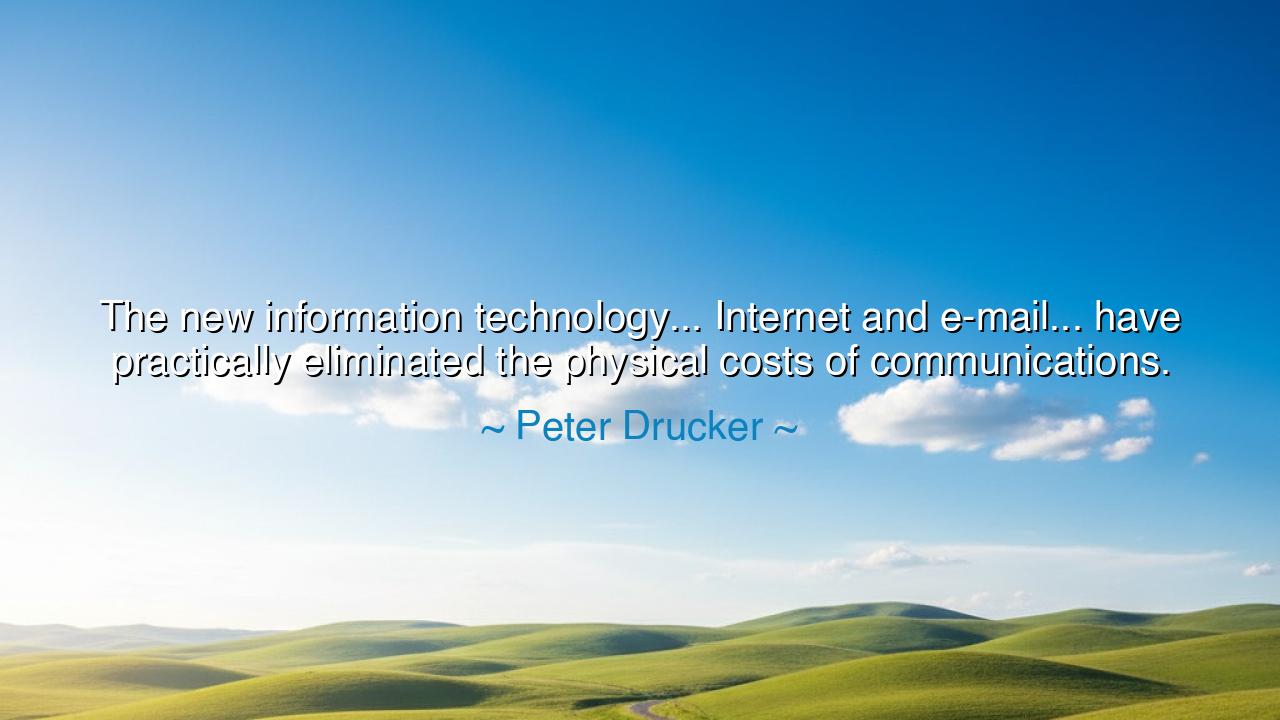
The new information technology... Internet and e-mail... have
The new information technology... Internet and e-mail... have practically eliminated the physical costs of communications.






In the tapestry of human progress, few innovations have shaped the course of civilization as profoundly as the rise of information technology. Peter Drucker’s words, "The new information technology... Internet and e-mail... have practically eliminated the physical costs of communications," reveal a truth that is at the heart of the digital age. In the span of just a few decades, the barriers that once constrained the flow of ideas, knowledge, and communication have been dismantled, and the world has become smaller, more interconnected, and infinitely more accessible. Yet, as we embrace this newfound power, we must remember the deeper implications of these changes—the opportunities they bring, as well as the responsibilities they place upon us.
The ancients understood the weight of communication well. In the early days of Rome, for example, the messenger was a revered figure. The circuit of communication in those days was slow and laborious, with messages carried across vast distances by foot or horseback. The cost of sending a message—both in time and resources—was immense. And yet, these communications were the lifeblood of the empire. It was through letters and decrees that emperors maintained their control, and soldiers coordinated their efforts across seas and mountains. What was once an endeavor limited by geography, manpower, and expense, has now become almost instantaneous and nearly cost-free, as Drucker points out.
Just as the Romans built roads to connect their empire and ease the flow of information, so too did the technological revolution of the 20th and 21st centuries create new "roads"—the Internet, email, and instant messaging. These tools, like the great Roman roads, have linked the world in ways previously unimaginable. The Internet allows people to communicate across vast distances with the click of a button, removing the need for physical presence or costly infrastructure. The email revolutionized communication by allowing the instantaneous exchange of ideas and information, regardless of the sender’s or recipient’s location.
Consider the example of Gutenberg's printing press, a transformative invention of the 15th century that democratized knowledge. Before the printing press, books were rare and expensive, and the spread of ideas was slow and limited to a privileged few. The printing press, much like the Internet today, broke down the physical and economic barriers to communication, making it possible for ideas to spread rapidly and for knowledge to be more widely shared. It is in this same spirit that the Internet has removed the physical barriers of communication, allowing people from across the globe to share ideas, collaborate, and learn from one another in real-time.
The lesson embedded in Drucker’s insight is one of both opportunity and responsibility. While the costs of communication have been drastically reduced, enabling a global exchange of ideas, we must also consider how we use this power. In ancient times, the spoken word was a force that carried great weight. The words of Cicero or Augustus had the ability to stir nations, to rally soldiers, and to inspire movements. Today, while our words travel with unprecedented speed, we must remember the power they carry. The ability to communicate instantly comes with the responsibility to ensure that we use it to enlighten, to empower, and to connect, rather than to divide or confuse.
In practical terms, this means that we must be mindful of how we use the tools of modern communication. The Internet offers immense opportunity for growth, connection, and innovation, but it also carries the risk of misinformation and superficiality. Email, while efficient, can easily become a source of distraction or frustration. As the ancients valued the art of speech, so must we value the art of listening, ensuring that we do not lose the deeper meanings behind the words we exchange. In a world where information flows as freely as water, we must guard against the erosion of thoughtfulness, ensuring that our communications are as meaningful as they are quick.
In the end, Drucker's words remind us that technological progress is not just a question of efficiency or convenience—it is about the deeper impact of these tools on our lives. The ability to communicate instantly is a gift, but it is a gift that requires wisdom and balance. Let us use the tools of information technology to build connections, to share knowledge, and to foster understanding. As the ancients sought to connect their world through roads, bridges, and letters, so must we use our modern technologies to unite, rather than divide, and to ensure that the flow of information serves the highest purposes of humanity. Communication, in its purest form, has always been a bridge between souls—let us not allow the speed of our technology to disconnect us from the heart of that mission.






AAdministratorAdministrator
Welcome, honored guests. Please leave a comment, we will respond soon